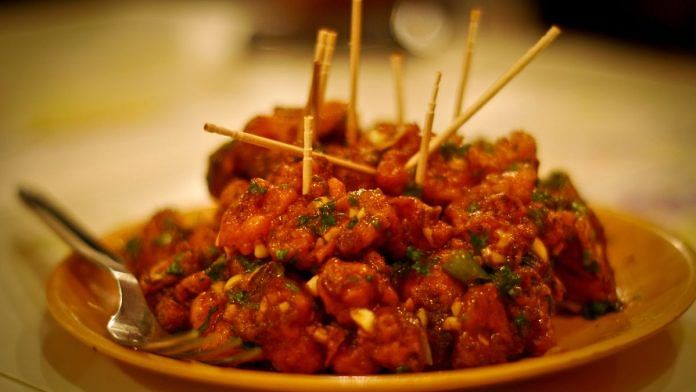New Delhi: Goa, famous for its beaches, vindaloo and feni, has now become the battleground for gobi manchurian. The merits of the Indo-Chinese dish, where batter-fried cauliflower florets are smothered in sauces, has become a polarising topic after it was banned from street stall menus and fairs in the Goan town of Mapusa. Now, everyone, from food lovers to nutritionists across India, is wading into the debate. The culinary crackdown is threatening to unleash a culture war pitting local Goan cuisine against ‘outside’ influences.
“This ban has been made keeping health-related concerns in mind and I think this is right too because the vendors were using synthetic colours in the dish which is very harmful to our health,” says food journalist Sourish Bhattacharyya.
While some are scratching their heads over the specificity of the ban— ‘Why not chicken manchurian?’—others say it’s a step in the right direction.
The spicy street-food dish, which has become hugely popular in Goa over the years, has also come under the radar of the authorities for the liberal use of synthetic colour and additives. Now, there are concerns that washing powder is being added to the flour and cornstarch mixture to keep the florets crispy for a longer period of time.
On X, people are questioning why the authorities are banning the dish instead of introducing and enforcing stringent rules against the additives.
Also Read: ‘Ghar ka khana’ to delivery apps — Indian food is changing, but you can’t blame women
India’s food colonialism
But it’s not just conversations about safety that this ban has brought forth. It reignited the local vs ‘outside’ food debate that took over Goa last October when the state government mandated that beach shacks serve fish curry and rice. The move was introduced to combat the rising popularity of North Indian dishes on shack menus which eclipsed the local cuisine.
But as one user on the Goa forum on Reddit points out “Bro it’s the Goans that eat Gobi Manchurian not tourists.”
Gobi manchurian is quintessential Indian food colonialism. We conquer, and love, a food so much that we love it out of shape and erode its entire identity. Ask Gaurav Kapoor, the comedian, and he has a list of sushis that have gone through the Indian blender he calls vikas puri—tandoori sushi, malai sushi.
Like with any popular street food, there is no one story on the invention of gobi manchurian. Its origins are linked to both Kolkata and Mumbai. The non-vegetarian version of the dish, chicken Manchurian, is tied to Nelson Wang, the restaurateur and chef who popularised Indo-Chinese food in Mumbai. He was the Chinese food caterer at the Cricket Club of India and went on to open the hugely popular China Garden in Mumbai.
The story goes that a customer wanted something different from the menu. Wang took cubed chicken, coated them in corn flour and deep-fried them. For his red sauce, he used onions, green chillies and garlic, vinegar and soy.
Today, the dish—the cauliflower and chicken version—is so popular it’s on menus in restaurants in New York, Dublin, Dubai and London, just not in China. It’s a truly Indian creation.
(Edited by Theres Sudeep)



